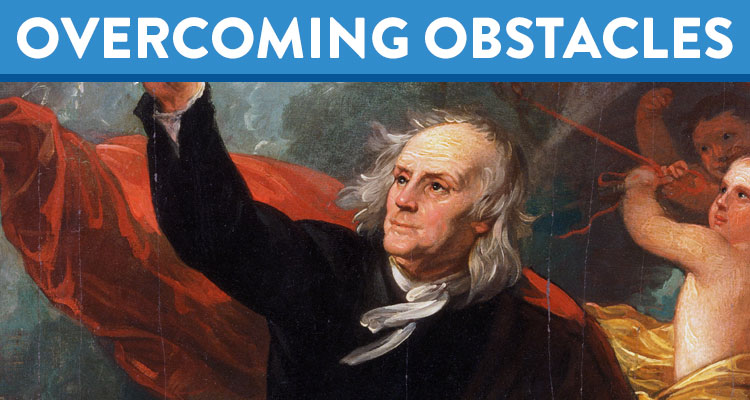You may know Ben Franklin as the wise elder of the American Revolution, signer of the Declaration of Independence and the Constitution, Ambassador to France, Governor of Pennsylvania, as well as an ingenious inventor, scientist, and witty author.
But you may not know his humble background and the obstacles he overcame to succeed. After all, most of our famous Founding Fathers came from rich, privileged backgrounds. Instead, a look at Ben Franklin’s life provides a worthy education in character.
Born and Raised
Born as Benjamin Franklin in Boston on January 17, 1706, he was the 15th of 17 children, the son of a soap and candle maker. After only two years of schooling, at age 10, he was forced to leave school and make candles for his father. As for further education, he was self-taught. At 12, he was apprenticed to an older brother James, who ran a print shop.
James was a cruel taskmaster, and would beat young Ben when displeased – which was often. When his brother started a newspaper, The New England Courant, James would not allow brother Ben to publish any of his own writing. So Franklin submitted 14 witty pieces under a made-up name, Mrs. Silence Dogood, and they delighted the paper’s readers. But when James discovered Franklin’s ruse, he was jealous and punished him severely again, eventually forcing Ben to escape his servitude – which was against the law.
Franklin ended up in Philadelphia, with just the wet and ratty clothes on his back and three pennies to his name. Hungry, we went in to a bakery shop and came out with three loaves of bread, one for his mouth and two tucked awkwardly under his arms. It was October 6, 1723, and as he devoured the bread, the bedraggled young man saw a charming young woman, Deborah Read, watching him. Little did either of them know that seven years later, they would be married!
An Early Lesson Revealed
In Ben Franklin’s famous Autobiography, he looks back on the mean treatment he received from his brother, and reveals an important lesson: a lifelong “Aversion to arbitrary Power.” This hard-earned lesson would match up well with the philosophy of the revolutionary movement. After all, just as Franklin got out from under his tyrannical brother’s beatings, so would the Colonies strive to gain independence from the tyrannical King of England’s “arbitrary power.”
The Philadelphia Years
That poor, 17-year-old boy pounded the pavements of Philadelphia and was able to find work, using his skills as a printer’s assistant and his many outstanding traits and talents to make his way in the world. He borrowed money and set up his own printing business. Before long, he was known as a tireless, honest, and diligent businessman, and Franklin gained attention and landed major jobs, setting up a thriving business.
After marrying his childhood sweetheart, Deborah Read, they set up their own dry goods store, and Ben opened up a book store. He didn’t stop there. At the ripe age of 23, in 1729, he bought a small newspaper, the Pennsylvania Gazette, and turned it into the most successful paper in the Colonies. He even created the world’s first political cartoon himself! And, while getting involved in civic improvement groups, in 1733 he also launched Poor Richard’s Almanack, which became famous for its down to earth advice and witty writing, such as “A penny saved is a penny earned.”
Prominence and Inventiveness
The list of Franklin’s ideas and accomplishments goes on and on, and this only scratches the surface:
- The nation’s first free library
- Philadelphia’s first fire-fighting company (“An ounce of prevention is worth a pound of cure,” was Franklin’s fire prevention advice).
- A fire insurance company
- The founding of the Pennsylvania Hospital and the University of Pennsylvania – both still in existence today
- Inventions such as the heat-efficient Franklin Stove and bifocals
- His famous experiments with a kite in a lightning storm verified the nature of electricity, and led to his invention of the lightning rod
- He even played three instruments and composed music!
By age 42, Franklin’s inventive, industrious nature had brought him from rags-to-riches, enabling him to retire from business and devote his next four decades to the revolutionary politics for which we know him best.
Franklin’s 13 Virtues
As we’ve seen, Franklin overcame many obstacles at a young age. And when he was just 20, in 1726, Franklin took what he had already learned from adversity and developed a method to improve his character by what he called “13 Virtues.” It was something he worked on for the rest of his life. His idea was to focus on only one virtue each week, “leaving all others to their ordinary chance.”
His autobiography lists his 13 virtues as:
- “Temperance. Eat not to dullness; drink not to elevation.”
- “Silence. Speak not but what may benefit others or yourself; avoid trifling conversation.”
- “Order. Let all your things have their places; let each part of your business have its time.”
- “Resolution. Resolve to perform what you ought; perform without fail what you resolve.”
- “Frugality. Make no expense but to do good to others or yourself; i.e., waste nothing.”
- “Industry. Lose no time; be always employ’d in something useful; cut off all unnecessary actions.”
- “Sincerity. Use no hurtful deceit; think innocently and justly, and, if you speak, speak accordingly.”
- “Justice. Wrong none by doing injuries, or omitting the benefits that are your duty.”
- “Moderation. Avoid extremes; forbear resenting injuries so much as you think they deserve.”
- “Cleanliness. Tolerate no uncleanliness in body, cloths, or habitation.”
- “Tranquility. Be not disturbed at trifles, or at accidents common or unavoidable.”
- “Chastity. Rarely use venery but for health or offspring, never to dullness, weakness, or the injury of your own or another’s peace or reputation.”
- “Humility. Imitate Jesus and Socrates.”
Franklin admitted that he fell short of these virtues many times, but believed that sincerely trying his best made him a better man, and contributed to his success and happiness. In his autobiography, he devoted more pages to the 13 Virtues than to anything else; in fact, he wrote, “I hope, therefore, that some of my descendants may follow the example and reap the benefit.”
We are all, in a sense, “descendants” of the great Founding Father, Ben Franklin. So by all means, take these virtues to heart, “follow the example and reap the benefit.”
Which one of Franklin’s 13 Virtues are most interesting to you? Leave a comment about it!
Image Credit – Benjamin Franklin via Wikimedia Commons





























































































